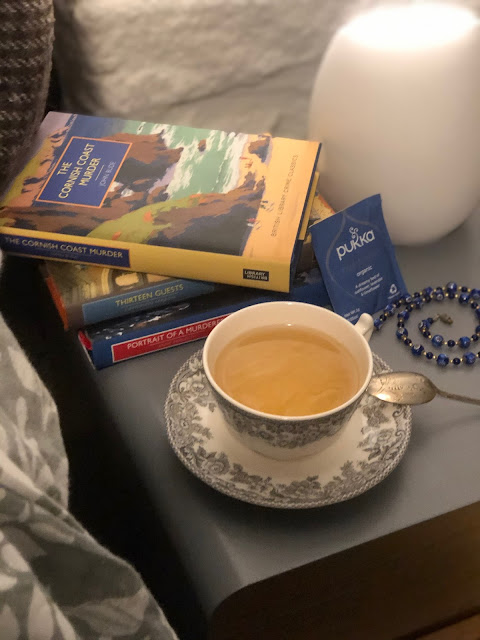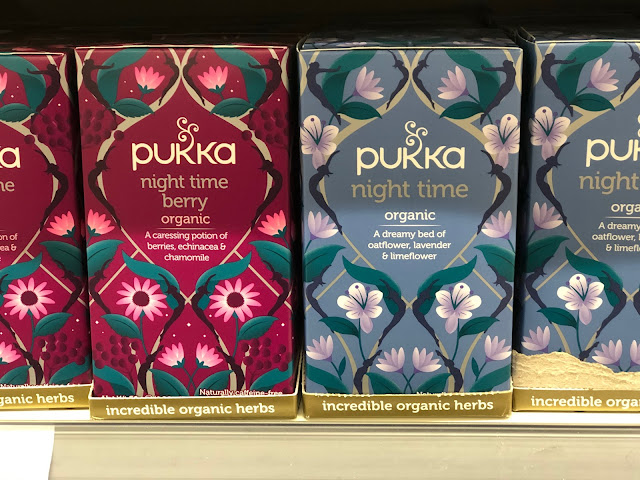"Sleep is the best meditation", this quote is attributed to Dalai Lama. If he truly said that, then I bow to his wisdom. Insomnia and lack of sleep, whether stress-induced or due to family circumstances (looking after a baby or caring after a family member with disabilities and health conditions) could be a kind of torture. Even when everything seems to be quiet around you, you are so wired up, you keep turning and tossing in bed, expecting to be disturbed soon. There's nothing worse than looking at the clock, and counting how many hours are left until you have to get up.
Reducing a daily amount of caffeine (mea culpa) is one of the tips for better sleep.
Pukka Night Time tea is naturally caffeine-free and ethically sourced. It's a dreamy blend of oatflower, lavender and limeflower. Other ingredients include licorice root, chamomile flower, valerian root and tulsi leaf.
The blurb on the box says, "Nights can be long when you most need peace. Here is nature's perfect path to restful nights and vibrant mornings. A gentle crush of oatflower, soothing lavender and silky-sweet limeflower. Let rest begin and sweet dreams follow".
Health benefits of this particular blend of herbs - reduction of stress and anxiety, and help with sleep - are a tempting call. Valerian acts as a natural sedative to ease tension and anxiety. Lavender flower, oatstraw flowering tops, chamomile flower and limeflower soothe, calm and ground your body and mind.
This blend has a delicate sweet aroma, a mix of floral and woody, and a sweet mellow flavour. The colour is light, straw yellow.
Recently Pukka Tea has asked me to test Pukka Night Time and keep a sleep diary.
Apart from the sleep diary, they sent a plan of actions to improve the quality of sleep.
Day 1. Create the perfect sleep environment. One that's cool, dark and free from clutter.
Day 2. Protect your sleep space. Remove technology from your sleep space and avoid exposure to blue light from screens.
Day 3. Set a sleep pattern. Set a bedtime and waking time you can stick to every day, even at the weekends.
Day 4. Practise a relaxing sleep routine you love. Your relaxing routine can be as simple as reading a book, listening to a podcast, meditation or adding essential oils to your bath or bed.
Day 5. Cut down on caffeine. Caffeine can help kick-start our day but try to avoid it after 12pm to make it easier to unwind in the evening.
Day 6. Unwind with sleepy ingredients. Include foods that contain tryptophan, such as oats, dates, almonds and herbs such as chamomile, lavender and spices such as nutmeg.
Day 7. Introduce light and movement to your day. Aim to get outside in natural daylight for at least 30 minutes every day, ideally doing some gentle movement.
These tips, designed by Pukka Herbs, are a cumulative challenge, so each tip builds on the day before.
Very sensible suggestions. I am happy to follow most of them, except the advice of not having any caffeine after 12pm. For me that would be unrealistic. If I don't have a cup of strong tea or coffee after lunch, I would be falling asleep around the school run time. I need more energy than the caffeine-free drinks can offer. Ideally, I should not have any caffeine in the late afternoon, but often I have my last cup of black tea around 4pm.
I enjoy a cup or two of herbal tea most evenings, mint and chamomile being my favourites. Mint is a great palate cleanser and is great after dinner, and a cup of chamomile with a teaspoon of honey is what I crave before bedtime.
To help people ease into good sleep habits, in-house herbal experts from Pukka Herbs have designed a free 7-day sleep support programme. The aim of programme is to clean up bad sleep habits and establish a good routine.
I was curious to see how tracking my daily habits, as well as how well I'm sleeping will give me personal insights to help improve sleep.
This is what the diary looks like (you can download it from Pukka - see Sleep Diary Digital):
I enjoyed having a cup of Pukka Night Time at bedtime for a week, but I haven't noticed any drastic changes in my sleep patterns. To be fair, the sleep programme sounds good, and the messages are positive, but one should also take into account personal circumstances and levels of anxiety. There are just too many worries at the moment, what with the Covid, my son's mental health, Mum's health problems, not being able to see her for over a year, and you can see why I find it difficult to sleep.
I will keep having herbal tea at bedtime because I enjoy the taste, and aroma, and hope that natural herbs will give me that elusive peace of mind and restfulness.
Disclosure: I received a selection of herbal teas from Pukka for the purposes of testing and reviewing. All opinions are my own.






I think this kind of "treatments" work if you are only a bit anxious on minor things, not under pressure from really complicated things to deal with.
ReplyDelete